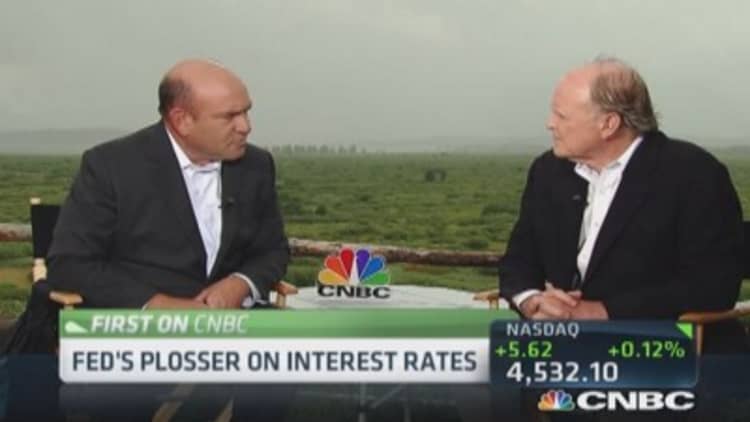
The Federal Reserve's current policy on interest rates is too "risky" and could lead to "traumatic" consequences, one of the Fed's most outspoken hawks said on Thursday.
"We are running a very risky policy, if you will, given where the stance of the economy is and seems to be going," Charles Plosser, the president of the Federal Reserve Bank of Philadelphia, said in an interview.
In the most recent Fed minutes—released Wednesday—Plosser dissented from the majority's statement, which holds that a rate hike will not occur for a "considerable time" after bond purchases are concluded. According to the minutes, Plosser said that the opinion did not recognize the U.S. economy's improvements.
Read More Fed's Williams: First rate hike during 2015 seems reasonable
Plosser said that the Fed should not keep waiting to raise interest rates and instead should pursue a gradual increase. Under the current plan, the Fed could be forced to raise them "very quickly" in the future as a response to the strong economy.
"The consequences of [not raising rates soon] could be traumatic at some point in time if we're not careful, because then we'll have to turn around and race to catch up," he said.

The Philly Fed president also discussed the Federal Reserve's signalling to the markets about its actions, saying that it should communicate what it wants to see from economic data, rather than set a timetable.
"What we really need to talk about is what are the data telling us when we choose to raise rates. We need to be responsive to the data, not to some calendar time or some point in time," he said, adding that the Fed should be more predictable about how it will react to data, which is something "we really don't do that very well."
Read MoreIs the Fed too hawkish?: Insana
Plosser did discourage placing too much weight on one data point, however, saying that focus on wages is not "wise." Measures of wages will lag inflation, and are "not a good predictor" of other economic indicators, he said.
With this in mind, Plosser said that the Fed should consider whether it is "trying to accomplish goals that actually we can achieve."
—By CNBC's Everett Rosenfeld


